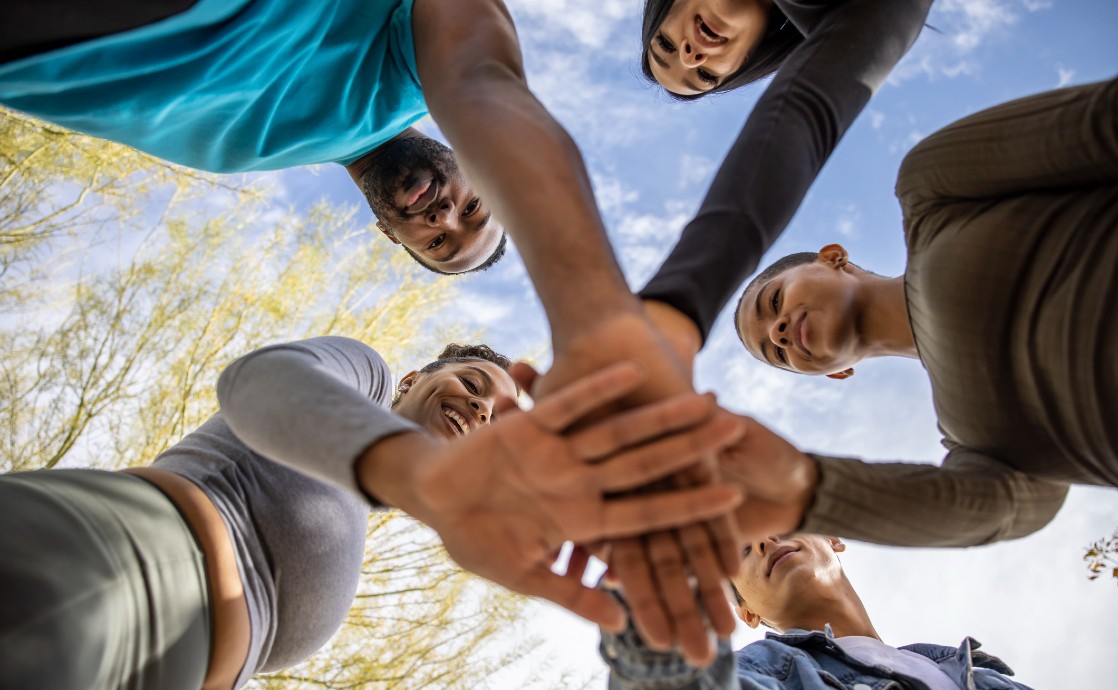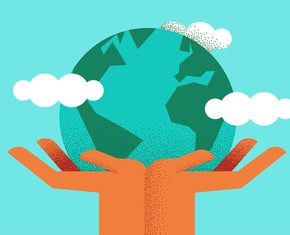The views expressed in our content reflect individual perspectives and do not represent the authoritative views of the Baha'i Faith.
While we can find elements of gender equality in the teachings of various spiritual traditions, these ideals have often been obscured by cultural interpretations and historical biases.
For instance, Buddhism emphasizes the equal potential of all beings for enlightenment. At the same time, Christianity teaches, “There is neither Jew nor Greek, there is neither slave nor free, there is neither male nor female, for you are all one in Christ Jesus” (Galatians 3:28, New Testament), hinting at spiritual equality. Similarly, the Qur’an states, “So their Lord responded to them: ’I will never deny any of you—male or female—the reward of your deeds. Both are equal in reward” (Qur’an 3:195). However, despite these powerful spiritual principles, such teachings have often been overlooked in practice.
RELATED: 3 Steps Toward Gender Equality
The Baha’i Faith, explicitly and unequivocally proclaims gender equality as a fundamental principle, emphasizing that the advancement of humanity hinges upon it. Baha’u’llah declared, “Women and men have been and will always be equal in the sight of God.” Expanding on this, Abdu’l-Baha stated, “The world of humanity has two wings—one is women and the other men. Not until both wings are equally developed can the bird fly.”
The Baha’i teachings place gender equality at the heart of their message, urging society to dismantle the barriers that limit the full participation of both men and women. In doing so, they call upon humanity to recognize a long-obscured truth that is now essential for collective progress and global unity.
The Influence of Societal Norms on Gender Roles
Societal expectations surrounding gender roles not only pose spiritual concerns but are also supported by research across gender studies, psychology, and sociology, highlighting their limiting impact on both men and women. Key findings include:
- Gender Role Socialization: From an early age, children are taught traditional gender roles that shape behaviors and choices, restricting their exploration of interests outside societal norms (Eagly & Wood, 2012).
- Career Choices and Opportunities: Gendered stereotypes about “appropriate” careers limit aspirations, with women facing barriers in male-dominated fields like STEM and men facing stigma in caregiving roles. These biases contribute to ongoing gender gaps in leadership and pay.
- Emotional and Psychological Constraints: Societal pressures on masculinity and femininity can harm emotional well-being, leading to mental health issues for men who suppress emotions and backlash for women displaying assertiveness (Kimmel, 2008; Rudman & Glick, 2018).
- Shared Domestic Responsibilities: Unequal division of domestic duties negatively impacts work-life balance. Studies show that when household responsibilities are shared more equally, satisfaction and well-being improve for both partners, benefiting children’s development (Pew Research Center, 2020).
- Benefits of Gender Equality: Research from the World Bank and UN shows that gender equality contributes to economic growth, better health, and greater innovation, benefiting society as a whole.
The Path to True Equality
True gender equality requires dismantling these restrictive societal expectations for both men and women, allowing them to pursue roles and activities that align with their personal interests, talents, and values rather than conforming to rigid norms. It calls for a shift from traditional gender roles to a more flexible approach that recognizes the diverse capabilities of individuals.
In this context, it is worth exploring the meaning of human potential and how it connects to the principle of gender equality. Baha’u’llah’s words invite us to reflect on this potential: “O SON OF SPIRIT! Noble have I created thee, yet thou hast abased thyself. Rise then unto that for which thou wast created.”
This statement speaks to the inherent nobility and capacity of every human being, a potential that is vast and divine in origin. Human potential can be understood as the innate ability of each person to live, learn, and act in alignment with their highest self, fulfilling a purpose that transcends mere survival and reflects the expression of their unique gifts.
True gender equality, therefore, is not just about equal rights or opportunities; it is about removing artificial barriers so that everyone, regardless of gender, can rise to the level of their noblest self. When the focus shifts from conforming to gender expectations to discovering and nurturing one’s unique qualities, the full spectrum of human potential is unlocked. This process is essential for realizing a more just, balanced, and prosperous society where every individual has the chance to flourish.
Transformative Conversations and Shared Responsibilities
One of the most transformative steps toward achieving gender equality is fostering open, heartfelt conversations within families and communities. These dialogues can elevate awareness of the pressures that both women and men face and help dismantle outdated gender expectations. By engaging in reflective discussions, families can develop a deeper understanding of how to share responsibilities more equitably.
As Abdu’l-Baha emphasized: “Why should woman be deprived of exercising the fullest opportunities offered by life? Whosoever serves humanity most is nearest God — for God is no respecter of gender. ”
Heart-to-heart conversations enable families to recognize when one member is carrying an unjust load, leading to a more compassionate and supportive environment. Questions like: “How can we support each other in balancing work and home life?” or “What assumptions do we hold about gender roles in our household?” can spark meaningful changes.
Baha’u’llah’s teachings emphasize unity and harmony as essential for creating a balanced society: “Since We have created you all from one same substance, it is incumbent on you to be even as one soul, to walk with the same feet, eat with the same mouth, and dwell in the same land, that from your inmost being, by your deeds and actions, the signs of oneness and the essence of detachment may be made manifest.”
This vision of unity calls for the balance of strengths, allowing men and women to contribute their unique qualities without one side overpowering the other.
Biological Differences and Complementary Roles
While it is important to honour the biological differences between men and women, these differences should not be seen as barriers to equality. Instead, they offer opportunities for complementarity, where both can contribute uniquely and harmoniously.
In the family, for instance, women biologically carry and nurture children during pregnancy, while men provide essential support. This dynamic of mutual care and responsibility extends until the child becomes independent. Understanding these roles from both biological and social perspectives invites us to recognize how men and women can complement each other rather than confining them to rigid, predefined roles.
By embracing this approach, we can develop a more holistic view of human potential — one where the strengths and capacities of each individual are nurtured and expressed within the cooperative framework of the family unit.
Celebrating Diverse Capacities and Embracing Grace
In exploring the interconnectedness of humanity, we recognize that the varying capacities of individuals play a crucial role in shaping a society where people can support and uplift one another. Likewise, Abdu’l-Baha stated: “Difference of capacity in human individuals is fundamental. It is impossible for all to be alike, all to be equal, all to be wise.” These differences, rather than creating division, are essential components of a vibrant and diverse community.
As we strive for equality, it is essential to establish societal structures that do not merely tolerate differences but actively celebrate and integrate them. This creates an environment where every individual, regardless of abilities or roles, is supported in fulfilling their highest potential.
Regarding this difference in capacity, Abdu’l-Baha reminded us that “this does not cause one to be shut out from gifts and bounties; for this is not the Day of Justice but the Day of Grace…” This perspective shifts the focus from a rigid merit-based system to one of divine grace, extending blessings to all, irrespective of their capacities or differences.
RELATED: A New Male Role Model: The Baha’i Ideal of Gender Equality
Work as Worship
The Baha’i teachings also connect the concept of work to service and spiritual fulfillment. Baha’u’llah stated: “It is incumbent upon each one of you to engage in some occupation—such as a craft, a trade or the like. We have exalted your engagement in such work to the rank of worship of the one true God.”
In this view, work is not merely a means of survival but a form of worship and service to society. Both men and women are called to bring their unique talents and capacities to their work, transforming it into an act of devotion.
Rethinking work as service rather than survival helps break down gender stereotypes and fosters environments where men and women are equally empowered to fulfill their highest potential. This shift can further gender equality by dismantling societal structures that limit both men’s and women’s participation in diverse fields, ensuring their contributions are equally valued.
A New Model of Being
True equality celebrates the unique contributions of both men and women, ensuring that each is valued and supported. It calls for societal structures that promote harmony and collaboration alongside a cultural shift toward mutual support and open-hearted dialogue. By embracing the Baha’i teachings on equality, balance, and unity, we can cultivate a new model of co-existence — one that empowers both wings of humanity to soar together, advancing collective progress and shared prosperity.
















Comments
Sign in or create an account
Continue with Googleor